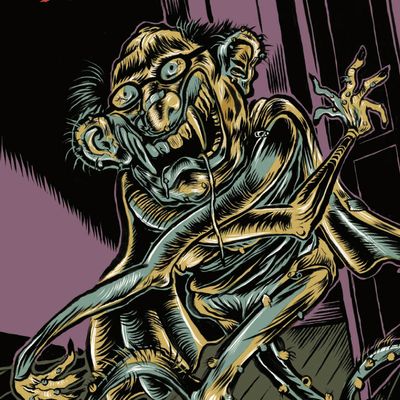
It was the first week of January and, as usual, the world was slipping ever more precipitously toward complete insanity. Newly installed Michigan congresswoman Rashida Tlaib had just made headlines for telling a crowd, in reference to President Trump, “We’re going to impeach the motherfucker.” Soon afterward, Trump — he of “shithole countries,” “Get that son of a bitch off the field,” and, “You’re not gonna raise that fuckin’ price” — responded by telling reporters, “I think she dishonored herself and her family.” Political cartoonists across the country traipsed to their drawing boards and contemplated how they could address the president’s hypocrisy while elevating themselves above the fray and maintaining good taste. But one of their number wasn’t interested in grace or editorial standards.
“I mean, if nobody else is gonna draw Trump shouting ‘My opponent’s language is a disgrace!!’ while fucking a pig carcass surrounded by Klansmen and kids in cages I guess I have my weekend cut out for me,” Eli Valley tweeted. One could be forgiven for thinking this was mere bluster, one of those anti-Trump tweets that serves as a vulgar venting mechanism and dissipates into the ether. But three days later, Valley tweeted out the fruit of his fury. Sure enough, it was everything the initial tweet had promised and more: a widescreen image of a gelatinous flesh-blob resembling the president of the United States copulating with a dead boar while nearby children suffer behind bars and KKK men gaze on from behind impassive hoods. It was rendered in Valley’s distinctively filthy chiaroscuro, all sweeping lines and gruesome textures, and the tweet’s text simply read, “Good morning.”
Valley’s been having a series of good mornings, by which I mean terrible mornings. His career’s going great, but that’s partly because everything else is going to hell in a handbasket. As the weight of humanity’s chaos has become more and more unbearable, Valley’s lewdly honest cartooning, fueled by his personal rage at a world gone wrong, has become a staple in the angrier corners of the American left, especially among its Jewish partisans. For well over a decade, Valley has unsparingly attacked political and communal leaders in the United States and Israel for their venality and sadism. Now, with two books on the stands and a devoted online following showering him with likes and retweets, Valley is demonstrating that he’s one of the only political cartoonists willing to enter into a staring contest with the abyss.
There was a time, not so long ago, when Valley was an unknown and profoundly uncontroversial figure who barely engaged in the debates that he so energetically dives into today. Sitting in his cramped, comic-book-brimmed studio apartment in downtown Manhattan, I ask him about a curious professional irony that demonstrates just how much his life has changed in recent years. In 1999, Valley was living in Prague, giving tours of Jewish historical sites in Eastern Europe, and he published his first book: a hefty prose tome entitled The Great Jewish Cities of Central and Eastern Europe: A Travel Guide and Resource Book to Prague, Warsaw, Cracow, and Budapest. It proudly wore a blurb from none other than Nobel–winning writer, Holocaust survivor, and Israel advocate Elie Wiesel: “This beautiful and melancholy book is more than a guide to great Jewish cities: it is a book of tales.”
But flash forward to August 2014 and you’ll find Valley publishing a comic called “Wiesel, Weaponized” in +972 Magazine, a left-leaning outlet that covers the Israeli–Palestinian conflict. At the time, Wiesel was emphatically advocating for the Israeli side in that summer’s war in the Palestinian territory known as the Gaza Strip. In the comic, sinister Israeli scientists affix Wiesel’s head and brain to the front of a bomb-dropping drone vehicle and use it to annihilate Arabs in Gaza while spouting platitudes like, “This is a battle between those who celebrate life and those who champion death!” At the end, the Wiesel drone flies off into the sunset, muttering fragments of pro-Israeli talking points: “Conscience of humanity … Civilization versus barbarism … Arabs … Death cult … Fires of Moloch … Israel chooses life …”
Valley says he was benighted when he wrote his first book, the one blurbed by Wiesel. As he puts it, “I was not educated at the time about Wiesel’s support for Elad” — an organization that represents Jewish settlers in the Israeli–occupied Palestinian West Bank. “So I was happy to have that blurb.” In the past, Valley had been inclined to sympathize with Zionism, the hard-to-define ideology that advocates for Jewish self-determination and has come to be synonymous with supporting the State of Israel. Now, he’s probably the leading critic of Zionism in American editorial cartooning. Two things led to the change. First, after learning more about Zionism’s past and present and seeing Israel take an increasingly rightward tilt, he became what he now calls a non-Zionist — i.e., someone who doesn’t define himself by the aim of destroying Zionism, but still questions it at a fundamental level. Second, he joined a fateful cartooning contest.
Valley had a prehistory of artistry. Growing up in New Jersey and upstate New York as the son of a largely secular woman and a conservative rabbi, he had loved comics and doodled his own. During his undergraduate career at Cornell, he’d drawn political cartoons for the school paper (he shows some of them to me and is profoundly embarrassed by his then-topical takedowns of things like the German reunification and petty university politics). But after college, he had no intentions of continuing down the visual artist’s path. That changed in 2006, when he entered a competition called the Israeli Anti-Semitic Cartoons Contest, which aimed to celebrate Jewish free expression in the face of an Iranian newspaper’s competition for cartoons about the Holocaust.* Inspired, Valley picked up his pen once again and drew a horrific image of a Jewish man with two phalluses sexually assaulting Muslim and Christian women. It didn’t win, but Valley — who had been harboring dreams of being a fiction writer — decided to try his hand at professional political cartooning.
Over the course of the next decade, Valley saw his expressionist, woodcut-esque work published in an array of venues — first in the alt-culture web magazine Jewcy, then mostly in the venerable Jewish outlet the Forward, where he became an artist-in-residence. In a noisy Manhattan coffee shop, Dan Friedman, the former arts editor and executive editor of the Forward, described Valley to me as “cutting-edge, doing stuff that no one else is doing, understanding it like no one else is understanding it, and presenting in a way that’s totally unique. Not only in the Jewish world, but actually, as far as I can tell, in the cartooning world. Partly because he’s self-taught and partly because he’s a unique guy.”
Valley barred no holds when he submitted work to the Forward, and occasionally had to be reeled back in. Even with editorial guidance, he regularly received blistering criticism from the Jewish establishment. Take, for example, one of his earliest Forward cartoons, November 2008’s “Evangelical Zionist Tours of Israel.” In it, he lampoons the kind of Christian Evangelicals who root for Israel out of a hatred for Arabs and a belief that Jews must retain sovereignty in the region in order to bring about Biblical armageddon and the subsequent victory of Jesus — as well as the Jews who accept their support. In one panel, a Christian tourist asks the prime minister of Israel, “Would you be so kind as to declare yourself king, then unmask yourself as the Antichrist?” To which the prime minister responds, “That depends. How much money do you have on you?”
The right-leaning, heavily Zionist magazine Commentary called that comic “ferociously repugnant.” The International Fellowship of Christians and Jews said it was “morally wrong, patently false, and an outrageous, mean-spirited spin on reality — even for a caricature.” An editorial at the American Thinker declared that the comic was “one of the most offensive cartoons I have even seen.” And that was only the beginning of Valley’s magnetism for critique.
A 2010 comic about wide-eyed American Jews who buy into the ideology of the Israeli ultra-Orthodox right wing prompted a prominent American ultra-Orthodox writer to vaguely link the comic to the then-recent Haitian earthquake. When Valley published a comic in which Israeli PM Benjamin Netanyahu sexually assaults Barack Obama in +972 (even the Forward refused to run it), the right-wing group NGO Monitor cited it in an attempt to strip the publication of its funding. Commentary even went so far as to call a 2012 Forward comic by Valley “firmly within the tradition of Nazi ideologue Julius Streicher’s anti-Semitic illustrations.” Valley’s response when I ask him about that last critique is appropriately harsh: “The ‘Nazi’ epithet reveals Commentary’s profound ignorance of Jewish history, culture, and politics, and its grotesque eagerness to trivialize the term ‘Nazi’ by equating criticism of Israel with Der Stürmer. It’s a shanda” — a Yiddish word meaning “shame” — “but that’s the role Commentary fills: shanda of the Jewish world.”
Matters came to a breaking point in late 2013, when the Forward published a Valley comic called “It Happened on Halloween,” which depicted the Jewish then-head of the Anti-Defamation League, Abraham Foxman, railing against Jews for not being sufficiently conservative. Foxman ultimately takes on the role of a raving anti-Semite, attacking a Jew who advocates for an embargo on Israel and screaming “perfidious Jew!” at him before being jailed. From his cell, Foxman yells, “The Jews did this to me! It was the Jews!” The real-life Foxman was furious and the Forward was barraged with calls and emails decrying the comic. Under great pressure, the Forward opted to tell Valley they would no longer be accepting pitches from him. He did a few scattered Forward cartoons over the ensuing months for appearances’ sake, but it was the end of an era for him.
And yet, Valley’s legend has only grown since then. He continued to be published in +972 and today has a home at comics site the Nib, the progressive magazine Jewish Currents, on his own Twitter feed, and elsewhere. He’s also returned to the print world for the first time since publishing his guidebook. In 2017, he published an oversize collection of his comics, along with commentary on them, called Diaspora Boy: Comics on Crisis in America and Israel, which sold out in its initial print run and featured a foreword from influential Jewish commentator Peter Beinart. (Beinart neatly summed up Valley’s appeal in the piece: “Eli Valley’s cartoons are outrageous and absurd. That’s because we’re living at an outrageous and absurd moment in American Jewish life.”) Last year, he provided illustrations for The Chapo Guide to Revolution: A Manifesto Against Logic, Facts, and Reason, a book published by the popular lefty podcasters of Chapo Trap House. For years, he also maintained a day job as editor of Contact, a Jewish-issues magazine published by the pro-Israel Steinhardt Foundation — remarkably, they allowed him to publish his comics, even one that attacked a program the foundation was involved in — but the magazine folded a few months ago. All Valley has now is his comics and his fury.
He reels at the alliance that the Israeli government and certain American Jewish organizations have formed with the Trump administration and the GOP that backs it. When Valley and I speak, it’s just a few weeks after the massacre of 11 Jews by an anti-Semite in Pittsburgh, and I ask him what he felt about the incident. He pauses for a moment, then responds, “There’s just weariness and outrage and fury and the sense that we could see this coming. We’d been watching it happen. We’d been sounding the alarms for years now. And our leadership in the Jewish community and what I call the GOP–Nazi Party now, because of the normalizing of the latter into the former, have ignored us or have responded to our sirens with, ‘Oh, but we love Israel’ and it’s like satire is dead.”
Indeed, Valley’s comics have been getting heavier and less conventionally satirical as the Trump era grinds on. Prior to November 8, 2016, he was contemplating a move into apolitical, surreal work. “But then this happened, Trump came into office, and I really do feel that everything is collapsing and I don’t really feel like I have an alternative,” he says. “The idea of drawing comics of that sort just seemed like such a comfortable and out-of-touch reaction to what’s happening. I would love to be able to get to them again but I just don’t know if this world is ever going to be able to come together in that way again.” Trump’s rise has also brought him to loathe certain Jewish institutions and individuals even more than he did before. He has come to feel that it’s time to excommunicate GOP-allied Jews from Jewry, altogether. As he put it in a speech at a recent Jewish Currents release party, “Jews who ally with Nazis are not Jews, and must be thrown out from the Jewish people before they destroy us all. For our own safety.”
Valley’s newer comics are so provocative and full of rage that they make the one that got him booted from the Forward seem positively tame. Just before the midterm elections, he tweeted out a drawing of Benjamin Netanyahu — who, like the Pittsburgh shooter, has railed against liberal Jewish billionaire George Soros — painting the words “KIKE SOROS” on a poster of the latter while he delivers a sinister smile and muses, “To our brothers and sisters in America, the State of Israel says: solidarity.” Just two days later, he tweeted out another envelope-pusher: caricatures of various Republican Jews toasting the Jewish new year — which, in the Hebrew calendar, is 5779 — and saying, “Our single wish for 5779 … is to ‘Make America Judenrein!’” Judenrein, of course, was the term the Nazis used to describe an area that had extinguished or expelled all of its Jews. The next day saw yet another audacious tweet, with an image of Trump wearing a swastika armband while Netanyahu embraces him, with the president declaring, “See, what’d I tell ya: The Jews love me!”
In other words, Valley is moving into darker and darker territory, which, if you share his political viewpoint, is entirely fitting for the times in which we live. His work is absolutely not for everyone, but the fact that he’s found a following provides him with some solace — not because fame eases his political pain, but because it means he’s not alone in his feeling that the time for artistic moderation is over. “I’m excited that there are new generations that are rejecting propaganda, so that gives me hope for the future, seriously,” he tells me. “Just the fact that despite the crisis and the agony and the apocalyptic tenor of our times, creating art that, to me, resists and also is resilient and embodies consciousness — my consciousness and the consciousness of hopefully some others — that is gratifying. That gives me, if not hope, then definitely sustenance through these times.”
*A previous version of this article misstated the impetus behind the Israeli contest — it was not in response to outrage over cartoons of the Prophet Muhammad.



